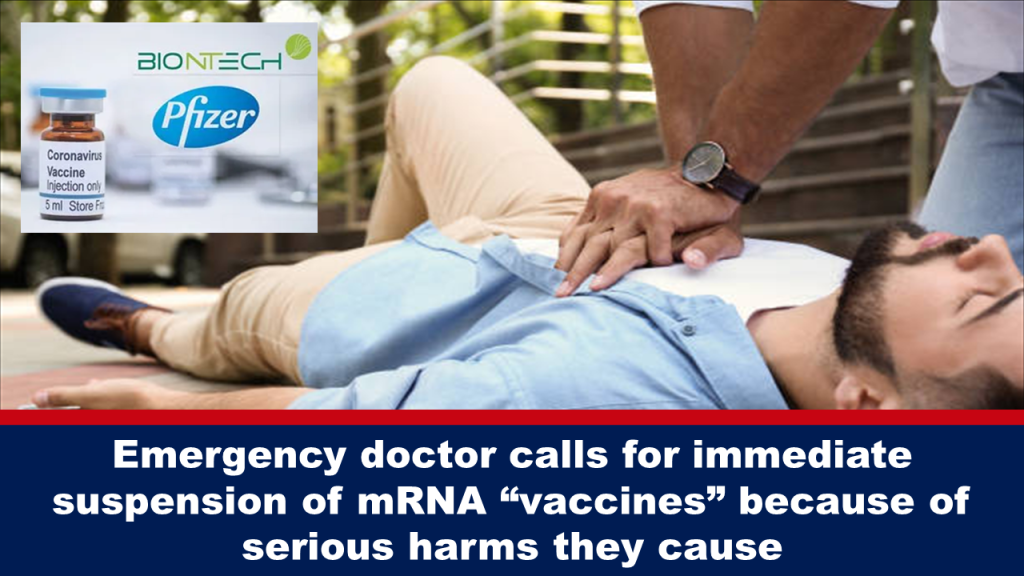-
Emergency doctor calls for immediate suspension of mRNA “vaccines” because of serious harms they cause

The lead author of peer-reviewed research re-analysing Pfizer and Moderna mRNA “vaccine” trials, Joseph Fraiman, called for an immediate suspension of covid injections due to serious harms. “This is huge,” Dr. Aseem Malhotra tweeted.
Fraiman, an emergency physician and a clinical scientist based in Louisiana, USA, has said that the covid mRNA injections can increase serious adverse events, including sudden cardiac arrests.
Fraiman was the lead author of a study ‘Serious adverse events of special interest following mRNA COVID-19 vaccination in randomised trials in adults’ published in August 2022. “These results raise concerns that mRNA vaccines are associated with more harm than initially estimated at the time of emergency authorisation,” the study authors wrote.
In a video posted on Rumble earlier this week, Fraiman said:
“We found the vaccine increases serious adverse events at a rate of one in 800. At the time of the publication, my co-authors and I did not believe our single study warranted the withdrawal of mRNA vaccines from the market. However, since its publication, new pieces of evidence have come to light and this has caused me to re-evaluate my position.
“In addition, we have multiple autopsy studies that find, essentially, conclusive evidence that the vaccines are inducing sudden cardiac deaths.
“I believe, given the information, the messenger RNA vaccines need to be withdrawn from the market.”
In the description below his video on Rumble, Fraiman provided several links to evidence that supports his conclusion the mRNA injections must be withdrawn
Joseph Fraiman: It’s time to withdraw the mRNA vaccines? (3 mins) On the same day that he posted his video, Fraiman tweeted another study with the comment: “FDA publishes study surveillance data finds Pfizer covid vaccine increases [the] risk of lung blood clots 50%. Not a single major news source report this. If FDA reported any other drug increased lung blood clots [by] 50% can you imagine our media staying silent?”
The study Fraiman was referring to was published in Vaccine on 9 January 2023 titled ‘Surveillance of Covid-19 vaccine safety among elderly persons aged 65 years and older’. “Monitoring safety outcomes following covid-19 vaccination is critical for understanding vaccine safety,” the study stated. “We present new findings from a nationally representative early warning system that may expand the safety knowledge base.”
The authors evaluated 14 outcomes post-vaccination using the US Centres for Medicare & Medicaid Services (“CMS”) data covering 30,712,101 elderly people. The CMS data from 11 December 2020 through to 15 January 2022 included 17,411,342 covid vaccinees who received a total of 34,639,937 doses.
Initially, four of the outcomes – pulmonary embolism, acute myocardial infarction, disseminated intravascular coagulation, and immune thrombocytopenia – following Pfizer injections met the threshold to trigger a safety signal warning. But after further evaluation, only pulmonary embolism only the safety signal threshold.
The study found that the rate ratios (“RR”) of observed outcome rates for pulmonary embolism post-Pfizer covid “vaccine,” compared to historical (or expected) rates before covid vaccination, was 1.54. In other words, 54% above the rates seen in those who have not had a covid injection.
A pulmonary embolism occurs when a blood clot blocks and stops blood flow to an artery in the lung. The clot often starts in the leg and travels to the lung. In the video below a vascular surgeon explains more about pulmonary embolisms and how they are treated.
UMMCVideos: What is a Pulmonary Embolism? 13 October 2017 (2 mins)






Login or Register to Leave a Comment